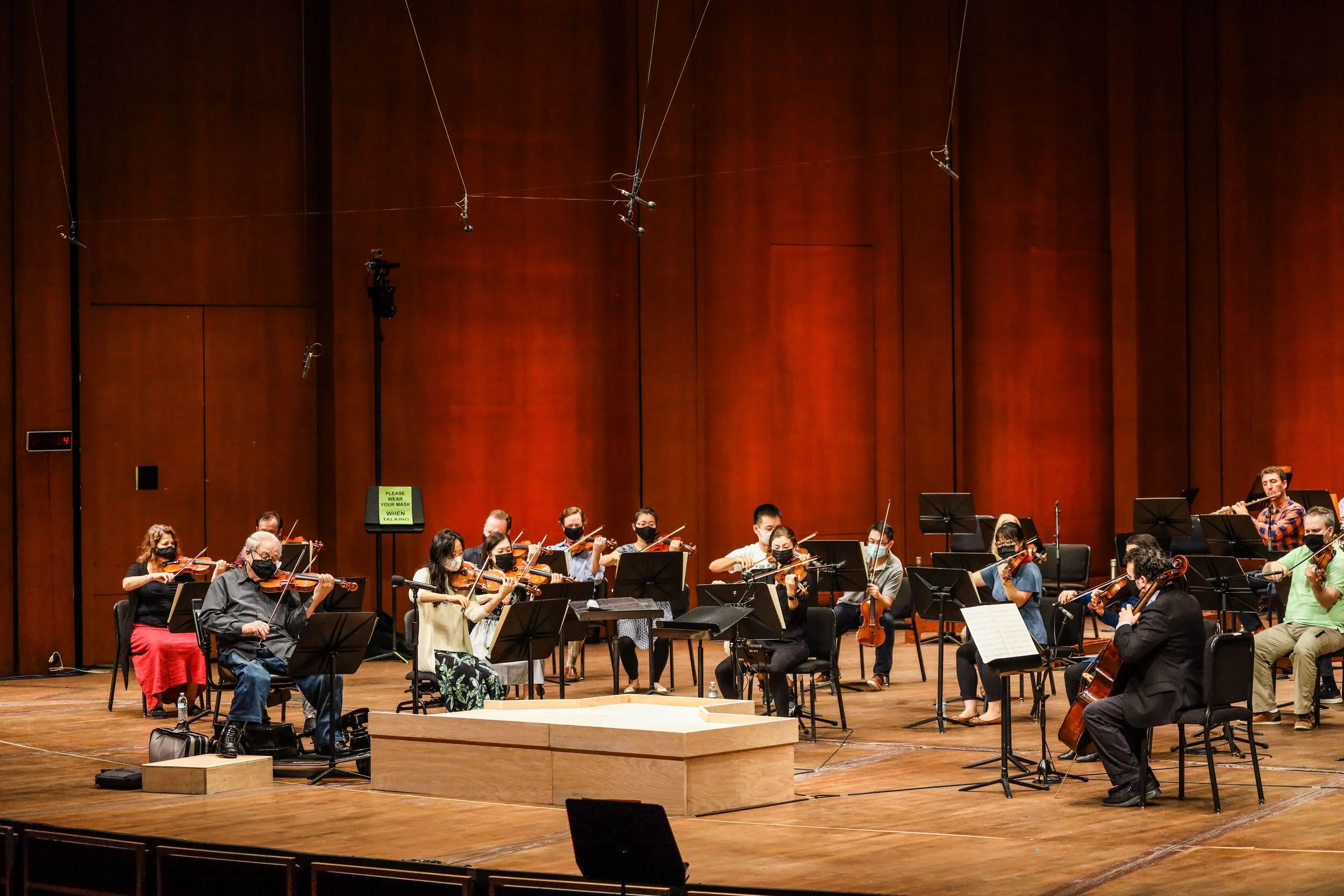Houston Chronicle praises Itzhak Perlman’s Houston Symphony play/conduct performances
Itzhak Perlman rehearsing for last weekend’s concerts with the Houston Symphony (Photo credit: Melissa Taylor)
Review: Itzhak Perlman performance a highlight of a difficult Houston Symphony season
By Chris Gray
Preview | Houston Chronicle
May 24, 2021
Had the world not gone awry, this past weekend Itzhak Perlman would have concluded the first leg of his three-year Houston Symphony artistic partnership by conducting Beethoven’s mighty Ninth Symphony. Instead, he and the orchestra delivered an enticing glimpse of what the next two seasons might look like — and a stirring lesson that even the great German composer’s deeper cuts go pretty hard.
Who needs “Ode to Joy” anyway?
Before Saturday’s concert, an introductory video noted that the symphony has been one of the few orchestras in the world to put on a full season of performances before a live audience. It been a real bright spot during the pandemic, and Houston owes the group a pat on the collective back and a hearty “well done.”
Silver-haired and spry, the 75-year-old Perlman proved a nimble and attentive conductor able to easily coax the orchestra towards the limits of its dynamic range. As a soloist, he featured on a pair of Beethoven’s Romances, brief compositions that were originally scheduled for the season’s opening-night concert.
The Romances, earthy and humble, date to the turn of the 19th century and amount to a dialogue between the soloist and orchestra on a pair of warm, poignant melodies. During the solo passages, Perlman took his time, savoring each note by lingering over it just long enough to lodge in the memory.
Both works are too early to rank among Beethoven’s most significant or difficult, but they still radiated the elemental humanity that quickly became the composer’s calling card. For Perlman, who appeared on “The Ed Sullivan Show” six years before the Beatles did, effortless expressiveness made a worthy trade for technical fireworks.
The next piece, the “Coriolan” overture of 1807, dialed up the wild-haired, wild-eyed composer pop culture remembers best. It began dark and dramatic, wracked by minor-key turmoil before lightening into a more lyrical theme. The two musical ideas sparred with each other through the bulk of the piece, a tension that steadily increased until ultimately boiling over in a final series of stormy chords. Then, just as quickly, it faded away to nothing — a signal of the title character’s suicide.
Completed in 1812, the Seventh Symphony ranks high on the list of Beethoven’s most enjoyable works; in concert, it’s a wonder to behold. (If the maestro had been a pop act, it would be one of those songs never released as a single but that fans hope to hear on every tour.) Perlman conducted with vigor, spurring the orchestra to sink its teeth into a piece whose dominant emotion is often simple joy — take that, Ninth.
In the Seventh, Beethoven’s gift for elevating simple rhythms and melodies to a grand scale reaches its zenith. The opening movement began with tender oboe notes playing off regal orchestral chords, before the strings began a pattern of ascending and descending scales that laid the foundation for the exuberant romp to follow — a swirling celebration of sound.
In the funeral marchlike second movement, which has become one of Beethoven’s most cinematic moments (witness “The King’s Speech” and 1934 horror classic “The Black Cat,” among others), the solemn main theme continued to bloom in volume until the winds and brass joined the strings in a gripping moment, allowing long-simmering emotions to boil to the surface.
The third movement sped by in a rush of instruments trading off triple-time patterns, hummingbird woodwinds and violins momentarily stilled by a majestic horn-led chorale before the whole dance started all over again. The finale was just as high-spirited but more visceral still, Perlman urging the entire orchestra into a furious gallop. He pulled the reins just often enough to keep things interesting, pacing the players enough for the symphony to finish with a breathless flourish.
When it was over, the audience left feeling nearly as spent as the musicians must have. (Or at least I did.) Despite the difficult circumstances, the symphony has a lot to celebrate about this past season. Although its Rodgers and Hammerstein tribute is still to come, Perlman’s appearance created the kind of good vibes that should last well into the summer.
For the full article, click here.

